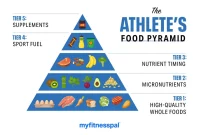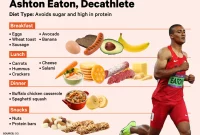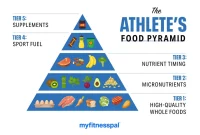Plant-based diets have gained popularity among endurance athletes in recent years. This article takes a deep dive into the benefits and challenges of adopting a plant-based diet for athletes looking to enhance their performance and recovery.
The Basics of Plant-Based Nutrition
Plant-based nutrition has gained popularity in recent years, especially among endurance athletes looking for sustainable and healthy dietary choices. A plant-based diet consists primarily of fruits, vegetables, whole grains, legumes, nuts, and seeds, while minimizing or eliminating animal products.
One of the key benefits of plant-based nutrition for endurance athletes is the high content of complex carbohydrates found in whole grains, fruits, and vegetables. Carbohydrates are the body’s primary source of energy, and a diet rich in complex carbs can provide the fuel needed for long-distance training and races.
Additionally, plant-based diets are typically rich in essential vitamins, minerals, and antioxidants. Fruits and vegetables are packed with vitamins C and E, which can boost the immune system and aid in muscle recovery and repair. These diets also tend to be high in fiber, which promotes healthy digestion and can help maintain a healthy body weight.
Another advantage of plant-based nutrition for endurance athletes is its potential anti-inflammatory properties. Many plant-based foods, such as leafy greens, berries, and nuts, contain natural compounds that have been shown to reduce inflammation and aid in post-workout recovery.
Getting an adequate protein intake is also crucial for endurance athletes, and plant-based sources can provide all the necessary amino acids. Legumes, such as beans and lentils, tofu, tempeh, and plant-based protein powders, are excellent protein sources that promote muscle growth and repair.
While a well-planned plant-based diet can offer numerous benefits for endurance athletes, it is essential to ensure proper nutrient intake and variety. Athletes may need to pay attention to key nutrients, such as iron, omega-3 fatty acids, vitamin B12, and calcium, as these are often found in higher amounts in animal-based foods. It is recommended to work with a registered dietitian to develop a well-rounded and balanced plant-based eating plan.
Balancing a Vegan Diet for Endurance
Plant-based diets have gained popularity among endurance athletes for their potential benefits in improving performance and overall health. However, it is crucial to ensure that a vegan diet meets the specific nutritional needs of endurance athletes to maximize their performance and avoid any deficiencies.
One key consideration is obtaining sufficient protein intake. While plant-based sources can provide ample protein, athletes need to include a variety of sources such as legumes, tofu, tempeh, seitan, quinoa, and hemp seeds. Combining different plant protein sources can help ensure a complete amino acid profile necessary for optimal muscle repair and recovery.
Another important nutrient for endurance athletes is iron. Plant-based iron sources include dark leafy greens, legumes, fortified cereals, and nuts. Pairing these iron-rich foods with sources of vitamin C, like citrus fruits or bell peppers, can enhance iron absorption.
Omega-3 fatty acids are vital for reducing inflammation and supporting cardiovascular health. While commonly found in fish, plant-based sources like flaxseeds, chia seeds, hemp seeds, and walnuts can provide the necessary omega-3s. Consider incorporating these foods regularly into your diet or exploring algae-based supplements as an alternative.
Carbohydrates are the primary fuel for endurance athletes. Vegan diets can offer rich sources of complex carbohydrates such as whole grains, starchy vegetables, and fruits. These foods provide sustainable energy, aid in glycogen replenishment, and support performance during training and competition.
Lastly, monitoring your vitamin B12 and vitamin D levels is essential as a vegan athlete. These vitamins are mostly found in animal-derived products, so it is crucial to consume fortified foods or consider supplementation to prevent deficiencies.
In conclusion, balancing a vegan diet for endurance requires careful attention to essential nutrients like protein, iron, omega-3s, carbohydrates, and vitamins B12 and D. By incorporating a diverse range of plant-based foods and considering supplementation when necessary, vegan athletes can thrive and achieve optimal performance in their endurance pursuits.
Success Stories of Plant-Based Endurance Athletes
Plant-based diets have gained immense popularity among endurance athletes in recent years. Many individuals have sought to fuel their long-distance endeavors with plant-based nutrition, resulting in remarkable success. These athletes have shattered misconceptions about the perceived limitations of a purely plant-based diet in high-performance sports.
1. Scott Jurek
Scott Jurek, an ultramarathon champion and former record-holder of the Appalachian Trail’s fastest known time, is a prominent advocate for plant-based eating. He attributes much of his endurance and recovery capabilities to consuming whole foods and plant-based recipes.
2. Rich Roll
Rich Roll, an accomplished triathlete, completed five Ironman triathlons in just seven days, only a few years after adopting a plant-based lifestyle. His extraordinary achievements exemplify the potential of plant-based diets in long-distance athletic endeavors.
3. Fiona Oakes
Fiona Oakes, a marathoner and long-distance runner, has set numerous records despite being a double amputee. She attributes her endurance and recovery to a vegan diet and passionately advocates for its benefits in athletic performance.
These success stories are not isolated incidents but rather representative of a growing trend among endurance athletes. Plant-based diets have shown to enhance cardiovascular health, aid in faster recovery, and provide the necessary nutrients for sustained high-performance activities.
Athletes who have transitioned to plant-based nutrition often testify to improved energy levels, increased stamina, and reduced inflammation. The abundance of plant-based protein sources, such as legumes, tofu, and tempeh, ensures they meet their dietary needs without relying on animal products.
While plant-based diets for endurance athletes have gained traction, it is essential to note that individual nutritional requirements may vary. Consulting a registered dietitian or sports nutritionist is recommended to tailor a plan that ensures the necessary nutrient intake for optimal performance.
Overcoming Nutritional Challenges
Plant-based diets have gained popularity among endurance athletes due to their potential health benefits. However, transitioning to a plant-based diet can present some nutritional challenges that need to be addressed in order to maintain optimal performance. Let’s take a closer look at these challenges and how they can be overcome.
Meeting Energy Demands
One of the primary concerns with plant-based diets for endurance athletes is ensuring sufficient energy intake. Since plant-based foods tend to be less energy-dense, athletes may need to consume larger volumes of food to meet their calorie needs. Prioritizing nutrient-rich, calorie-dense foods such as nuts, seeds, avocados, and whole grains can help athletes meet their energy demands without consuming excessive amounts of food.
Adequate Protein Consumption
Protein is essential for muscle repair and recovery, making it crucial for endurance athletes. While animal products are typically high in protein, plant-based athletes can still meet their protein needs by incorporating a variety of plant-based protein sources. Foods like tofu, tempeh, lentils, beans, quinoa, and hemp seeds are excellent sources of plant-based protein. Athletes should focus on consuming a mix of these protein sources throughout the day to ensure adequate protein intake.
Obtaining Sufficient Micronutrients
Plant-based diets can provide an abundance of vitamins and minerals; however, some nutrients may require extra attention. Iron, calcium, omega-3 fatty acids, and vitamin B12 are among the nutrients that can be more challenging to obtain solely from plant-based sources. Endurance athletes following a plant-based diet should consider incorporating foods like leafy greens, legumes, fortified plant-based milk, chia seeds, and algae-based supplements to ensure they are meeting their micronutrient needs.
Optimizing Recovery
Recovery is instrumental in an athlete’s performance, and plant-based diets can play a role in enhancing the efficiency of the recovery process. Consuming a combination of carbohydrates and protein within the first hour after exercise can aid in muscle glycogen replenishment and enhance muscle protein synthesis. Post-workout meals can include options like smoothies made with plant-based protein powder, whole grain toast with nut butter, or plant-based yogurt with fruits.
Seeking Professional Guidance
Overcoming the nutritional challenges of a plant-based diet for endurance athletes can be simplified with the help of a registered dietitian or sports nutritionist. These professionals can provide personalized guidance, tailor meal plans, and ensure that all nutritional needs are met to support optimal performance.
In conclusion, while plant-based diets offer numerous health benefits for endurance athletes, they require careful attention to ensure adequate energy intake, protein consumption, and micronutrient availability. By addressing these challenges head-on and seeking professional guidance, athletes can successfully navigate a plant-based diet while achieving their performance goals.
Supplements for Vegan Athletes
When following a plant-based diet, it is crucial for vegan athletes to ensure they are meeting their nutritional needs to support their athletic performance and recovery. While a well-planned vegan diet can provide most of the necessary nutrients, certain supplements can be beneficial for vegan athletes to optimize their performance. Here are a few key supplements to consider:
1. Vitamin B12
Vitamin B12 is primarily found in animal products, making it important for vegans to supplement. B12 supports red blood cell production and nerve function, which are vital for athletes. It is recommended to take a B12 supplement or consume fortified foods regularly.
2. Iron
Iron is necessary for carrying oxygen to muscles and maintaining energy levels. Plant-based iron sources include legumes, whole grains, and dark leafy greens, but the absorption of iron from plant foods is lower compared to animal sources. To ensure adequate iron intake, vegan athletes may consider an iron supplement or combine iron-rich foods with vitamin C sources to enhance absorption.
3. Omega-3 Fatty Acids
Omega-3 fatty acids offer anti-inflammatory benefits and support heart health. While commonly found in fish, vegan sources include flaxseed, chia seeds, and walnuts. However, the conversion of these plant sources into the active form of omega-3s may be inefficient in some individuals. To meet their needs, vegan athletes may choose to take an algae-based omega-3 supplement.
4. Creatine
Creatine is involved in the production of adenosine triphosphate (ATP), the main source of energy for muscle contractions. While creatine is naturally synthesized in the body, supplementing with it can enhance athletic performance, especially for high-intensity activities. Vegan athletes can opt for creatine monohydrate, which is not derived from animal sources.
Remember, supplements should be used to complement a well-balanced diet and not replace whole foods. It is advised to consult with a healthcare professional or registered dietitian for personalized recommendations based on individual needs and preferences.
Conclusion
In conclusion, plant-based diets can provide numerous benefits for endurance athletes. They are rich in nutrient-dense foods, help in reducing inflammation, and promote faster recovery. Additionally, they can contribute to improved overall health and lower the risk of chronic diseases. While individual preferences and nutritional needs may vary, adopting a plant-based diet can be a viable option for athletes looking to enhance their performance and well-being.




